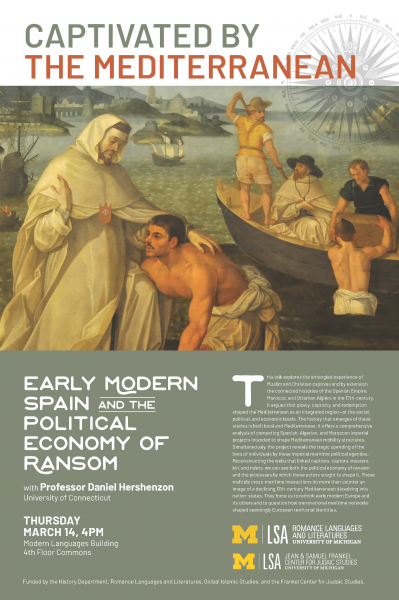Captivated by the Mediterranean: Early Modern Spain and the Political Economy of Ransom
Professor Daniel Hershenzon, University of Connecticut
In 1608, Genoese naval forces took a thirteen-year-old Algerian girl named Fatima captive and sold her into slavery in Livorno, Italy. Her father almost succeeded in ransoming her, but days before her liberation she was forcibly converted and baptized as “Madalena.” In an unrelated incident, also in 1608, Algerian pirates captured the illegitimate son of the Spanish Marquis de Villena, and enslaved him in Algiers. While a captive, he was taken to Istanbul where, after attempting and failing to arrange his ransom, he converted to Islam. Piecing together these Mediterranean episodes from the archives leads to a third story beginning just a year after the capture of Fatima and Pacheco. In 1609, three Spanish Trinitarian friars were on the brink of departing for Spain with Christians they had redeemed from the Maghrib when the Algerian Governing Council detained them. At first glance, though they all occurred within a five-year period and in the same geographic area, these stories do not seem to have much to do with one another. Yet these different Mediterranean trajectories intersected and had strong effects on one another, whether through their ransom negotiations, for example, or in that one captive was taken as revenge for the imprisonment of another.
This talk explores the entangled experience of Muslim and Christian captives and by extension the connected histories of the Spanish Empire, Morocco, and Ottoman Algiers in the 17th-century. It argues that piracy, captivity, and redemption shaped the Mediterranean as an integrated region—at the social, political, and economic levels. The history that emerges of these stories is both local and Mediterranean. It offers a comprehensive analysis of competing Spanish, Algerian, and Moroccan imperial projects intended to shape Mediterranean mobility structures. Simultaneously, the project reveals the tragic upending of the lives of individuals by these imperial maritime political agendas. Reconstructing the webs that linked captives, captors, masters, kin, and rulers, we can see both the political economy of ransom and the processes by which these actors sought to shape it. These multiple cross-maritime interactions do more than counter an image of a declining 17th-century Mediterranean dissolving into nation-states. They force us to rethink early modern Europe and its others and to question how transnational maritime networks shaped seemingly European territorial identities.
This talk explores the entangled experience of Muslim and Christian captives and by extension the connected histories of the Spanish Empire, Morocco, and Ottoman Algiers in the 17th-century. It argues that piracy, captivity, and redemption shaped the Mediterranean as an integrated region—at the social, political, and economic levels. The history that emerges of these stories is both local and Mediterranean. It offers a comprehensive analysis of competing Spanish, Algerian, and Moroccan imperial projects intended to shape Mediterranean mobility structures. Simultaneously, the project reveals the tragic upending of the lives of individuals by these imperial maritime political agendas. Reconstructing the webs that linked captives, captors, masters, kin, and rulers, we can see both the political economy of ransom and the processes by which these actors sought to shape it. These multiple cross-maritime interactions do more than counter an image of a declining 17th-century Mediterranean dissolving into nation-states. They force us to rethink early modern Europe and its others and to question how transnational maritime networks shaped seemingly European territorial identities.
| Building: | Modern Languages Building |
|---|---|
| Event Type: | Lecture / Discussion |
| Tags: | Economics, Free, Lecture, Politics, Spanish Studies |
| Source: | Happening @ Michigan from Judaic Studies, Global Islamic Studies Center, Department of History |
The Global Islamic Studies Center organizes a number of public events each year such as lectures, conferences, and films, many in collaboration with other U-M units. Please use our searchable events calendar for information about upcoming programs sponsored by GISC and the Interdisciplinary Islamic Studies Seminar (IISS).


